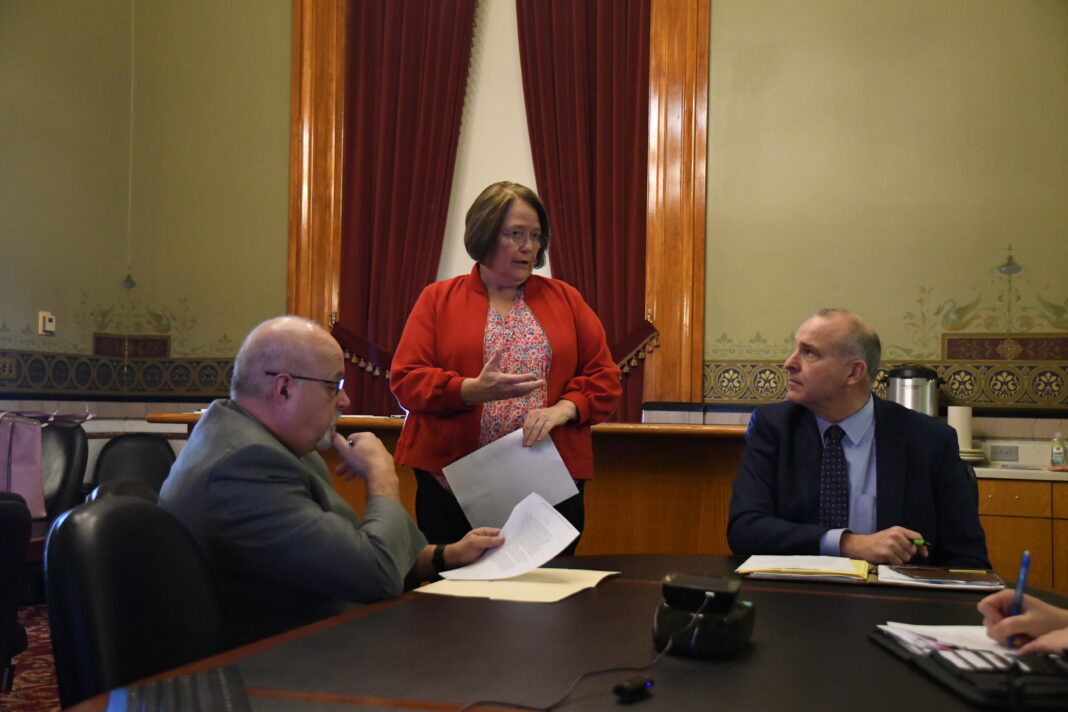An Iowa Senate subcommittee approved a bill that would require public school districts to accept students from nonpublic schools who reside in the district if they wish to participate in certain activities not offered by the nonpublic school.
The participation of the nonpublic school students would not be considered for classification as it relates to athletics.
House File 2553 allows any fees charged for participation to be required of the nonpublic school student in order to participate. The bill passed the Iowa House earlier this year 56-39.
Jean Berger, executive director of the Iowa Girls High School Athletic Union, said the bill wouldn’t significantly impact the organization.
Berger added there is already a waiver process in place if an agreement isn’t reached between nonpublic schools and public schools.
She cautioned that many times girls who go from a small school to play sports at a larger school have not had the benefit of participating in a feeder system.
“They come to a high school that’s much larger and they have not had the background or the experience,” Berger said. “So our preference would be the school find someone more like them to share with or start their own program so that that girl’s experience would more fit her talents and abilities and so that she doesn’t go and have to compete against girls who have been playing for years.”
Dave Daughton of the Rural School Advocates of Iowa and School Administrators of Iowa said the organizations are undecided and have no issue if it is one kid, but if it is 30 kids going into a program, then it could be an issue.
Samantha Fett spoke in support of the bill on behalf of Inspired Life, noting that the bill is in the same spirit of the Educational Savings Accounts from last year.
“Families at private schools are being denied access to play sports in public schools and they’re struggling with that partnership,” Fett said. “This bill is something that will solve that.”
Fett said the bill represents an opportunity to improve health among the upper grades and allows nonpublic school students to go play sports with their friends in a public school if the nonpublic school doesn’t offer such a program.
Eric Goranson of the Iowa Association of Christian Schools said the bill originated from one of his members and is an issue seen across the state.
While many public schools do a great job making accommodations for nonpublic school students to participate, there are outliers that are denying access to extracurricular events simply because they aren’t happy a private school exists within the district.
“This is not just athletics, but also scholastic,” Goranson said. “Many of those types of programs might be a little bit capital-heavy.”
Goranson said the bill is “necessary” and it will help both public and nonpublic schools.
“We have a lot of parts of the state where public schools are calling and asking if anyone is interested in a cooperative agreement because they need an extra player,” he said. “And we have others who would rather not work with us. But we’re all paying for the same services in the same system, so we would like to have access.”
Democrat State Sen. Claire Celsi asked if public school students would be allowed to participate in programs at a nonpublic school, but the bill doesn’t offer that scenario.
“This is for the other way around because that school already offers a sports program,” Republican State Sen. Tim Kraayenbrink said.
Celsi said that doesn’t seem fair to her.
“I mean, we’re all getting public money, right,” Celsi asked. “Right, Samantha? We’re all getting public money, so we should really share all these programs with everybody.”
Fett responded that there is $1,200 intended for the education of a student that remains with the public school when a student decides to instead enroll in a private school.
“Oh wow, a whole $1,200 — that’s a lot of money,” Celsi said sarcastically.
Republican State Sen. Lynn Evans said he has experience setting up cooperative programs as a school administrator and as a former coach. Ultimately he said the state and educators alike should desire to give all kids in the district an opportunity to perform.
“This bill is about ensuring that all students that reside within a public district have an opportunity, whether they take advantage of that opportunity or not is entirely up to them,” Evans said.
Kraayenbrink noted the scenario is voluntary right now, but this bill requires public schools to accept such students for participation. He asked how public schools handle homeschooled students, who are required to be allowed to participate.
Evans and Kraayenbrink supported the legislation while Celsi opposed it. The bill is now eligible for a full committee hearing.
Republican Representatives Jane Bloomingdale, Austin Harris, Chad Ingels, Shannon Latham, Tom Moore, Ray Sorensen and David Young all opposed the legislation in the House.

















